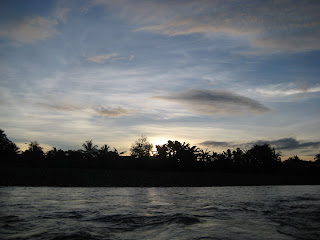Now, just days from stepping back onto a plane and closing this chapter of my life, I find myself, ironically, anxious and pensive. Anxious for what awaits me Stateside. Pensive of my service, what it meant to me, and what it meant to my community. A conversation I will likely be having with myself for the rest of my life.
To Laguna: thank you. You graciously opened your homes and your hearts to me. Over the last two years we have sweat together, laughed together, and even shed a tear or two together (at the innocent loss of life). We have taught each other much about a world we were previously unfamiliar with. However, I think it goes without saying that I will walk away from this having learned the most.
You taught me patience. Time, in your culture, is little more than a suggestion. It infuriated me at first, but I've come to understand what it means to you. Never do I expect a finger to be lifted until we've all shared proper greetings, updates on each others families, and a weak cup of coffee.
Once it was time to work, however, you taught me what it meant to sweat. To really, really sweat. Your body-weight to cargo-load ratio is amazing. And the speed at which you get it to it's destination, incredible. One volunteer has termed it "gross domestic toughness." Whatever you call it, you have forever humbled me.
You showed me what it's like to grow up without an education and to have little exposure to the outside world. Milisciado, you often showed up at my house to discuss your view on life, on local events, or whatever happened to fill your mind for the day. I will never forget our conversations. One particular day you told me how you think the frogs fall from the sky, like rain. How else would so many of them end up at the same time and place, year after year? My efforts to explain things were fruitless. I was far more sane in your eyes to simply agree and progress the discussion. Yes, it is incredible! Especially how they only fall at night so we can't see them.
The strongest lesson I will walk away with is not doubt the simplest (and somehow a reoccurring one in my life): work hard. Always. No matter what the conditions are. I found that the people I was most eager to help were those who are motivated to improve their lives, who don't just hold out a hand and say, "what are you going to do for me." Those who make the most of what they have inspire those around them. In the case of my community they inspired me to go far out of my way to help them when they likely needed it less than others in the community. If only I knew how to teach motivation. Possibly that's the real key to success.
 My community.
My community.Who knew a bottle could be so much fun.
Looking back on the last two years, I believe I will walk away having learned more than I was able to contribute. I'm not sure I would have expected that when I started. I'm not sure I thought about it. I am starting to think that this is the most valuable aspect of Peace Corps. Not what we leave behind, but how our service will shape our lives and decisions when we return home. I wonder if more is done for the impoverished through our choices (financial support, economic values, policy decisions, etc.) and those with whom we share our experiences (family, friends, coworkers, etc.) than from the buildings, or the crops, or the education we are able to leave behind.
Another outcome of my Peace Corps service that I hadn't anticipated is my community's perspective of America. When I showed up and said I was from Los Estados Unidos most people mentioned a war they had heard of on the radio, or "the country where our money comes from." One man used the verb "harvest" with respect to printing money. (Note: The U.S. had a presence in Panama at the time of independence from Columbia in the early 1900s. Consequently, Panama immediately started using the U.S. dollar and has never had their own currency.) Now, if you were to ask them what Los Estados Unidos means to them I think you would hear stories of the "tall man" that lived with them. In fact, I bet they would ask you if you know him. It pleases me to see opinions of America based on relationships and not news.
Still, I'm sure many of you (and even I, myself) wonder if it's really worth the time and money. It is no doubt an experience I will cherish for the rest of my life. But, I am not the only one who made a sacrifice over the last two years. If you pay taxes you contributed to my experience. Just how much? This year's Peace Corps budget is $331 million, funding the structure that supports approximately 9080 volunteers in 74 countries. That means each volunteer costs roughly $73,000 over the two-year period. I will let you, the reader, decide if you think it's worth it. I know that I wrote much more about my life on this blog than about the work I did. However, I think there is enough here for you all to decide.

Ciao.
Rob/Roberto/Choi
 The sunset from Laguna.
The sunset from Laguna.Panama rain.
 A three day walk to the Atlantic.
A three day walk to the Atlantic.We found a snake!



























































